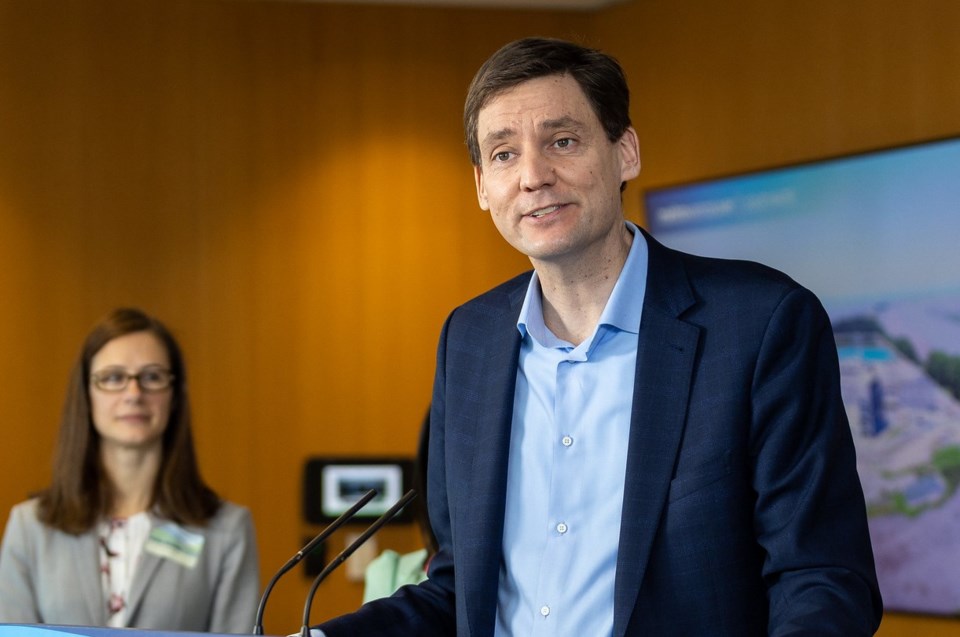The B.C. government has embarked on an unprecedented spending spree over the past four months, shovelling billions of dollars of an unexpectedly large budget surplus out the door to community groups, transit organizations and municipalities.
But as the March 31 spending deadline nears, one thing is growing increasingly clear: There’s no way the province can spend all the remaining money in the time it has left.
Conservatively, Premier David Eby still has more than $2 billion in surplus funds at his disposal over the next 11 days, before the end of the fiscal year. After that, anything unspent automatically, by law, goes onto provincial debt.
In reality, the number could be higher than $3 billion, given the improved revenues the province recorded in the last quarterly update in February. But accounting for the immense amounts of money flowing into, and out of, the provincial treasury these days is near-impossible. We won’t know for sure until August, when the year-end public accounts are released.
Still, we can attempt to ballpark where we are right now, roughly.
The Eby administration has spent around $4.6 billion in surplus funds since the new premier took office last November. That kind of windfall is extraordinary. The finance minister has described it as a “once-in-a-generation” amount of money, largely due to the economic rebound from COVID-19 and tax adjustments from people and businesses.
Some of the biggest items have included:
- $1 billion: One-time cash payments based on population to B.C.’s 188 municipalities and regional districts, to be used to help build projects that accommodate increased populations. Called the “Growing Communities Fund,” it paid out $400 million to Metro Vancouver municipalities alone, including almost $90 million that the City of Surrey announced it would apply to reduce a 17.5-per-cent proposed property tax increase caused by its planned transition back to the RCMP.
- $500 million: A bailout of BC Ferries to prevent a 10-per-cent increase to ticket prices and instead hold the average increase to three per cent annually over the next five years, plus position the ferry corporation to invest in a conversion to electric ferries.
- $500 million: A doubling of B.C.’s existing Climate Action Tax Credit, from $500 per year to $900 for a family of four. The credit is income-based, and not everyone is eligible.
- $500 million: A second B.C. Affordability Credit, of up to $410 for a family with two children, or $164 per adult, set to arrive in April.
- $479 million: A bailout of Metro Vancouver’s TransLink system to prevent what transit officials described as fare hikes and service reductions caused by a drop in ridership that has yet to fully recover from the pandemic.
There’s also other smaller-scale funding, including $30 million for fairs and festivals, $65 million for Prince Rupert water upgrades, $160 million for food security, $150 million to boost 911 services and $150 million to improve cancer research at the BC Cancer Foundation.
It is the most money spent in the shortest amount of time by any B.C. government in modern history (outside of the COVID-19 pandemic).
But there’s more left.
The surplus was projected at almost $5.7 billion in the second-quarter financial update last November. In that scenario, Eby would still have $1.1 billion remaining for the next week and a half.
But revenues were more rosy in the most recent financial update for the third-quarter in February, adding another $1.6 billion in revenue into the mix. If that scenario holds, Eby is more likely presiding over a surplus in the high $2 billion range, perhaps even into $3 billion, despite all his recent spending.
Can the B.C. government spend as much as $2 billion to $3 billion in the next 11 days? Unlikely.
The premier does have some more announcements in the hopper, but expect to see a large amount of that money rolled onto the provincial debt March 31 anyway.
There’s a limit to how fast a government can spend – even when it institutes an almost zero-control and zero-audit policy as the Eby government has done these past few months in an attempt to get money off the books. The NDP has reached that limit.
When the books close March 31, we’ll have witnessed an extraordinary period of financial largesse by a provincial government. Just don’t get too used to it. The economy has ground to a halt and the budget has cratered back into deficit for the fiscal year starting April 1.
The NDP should enjoy these final days of big spending while they last. They may never come again for this premier, or this government.
Rob Shaw has spent more than 15 years covering B.C. politics, now reporting for CHEK News and writing for Glacier Media. He is the co-author of the national bestselling book A Matter of Confidence, host of the weekly podcast Political Capital, and a regular guest on CBC Radio.



